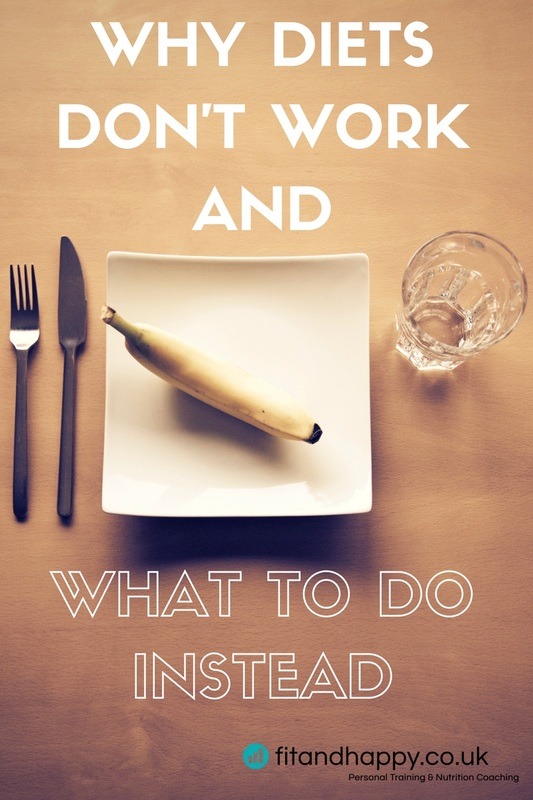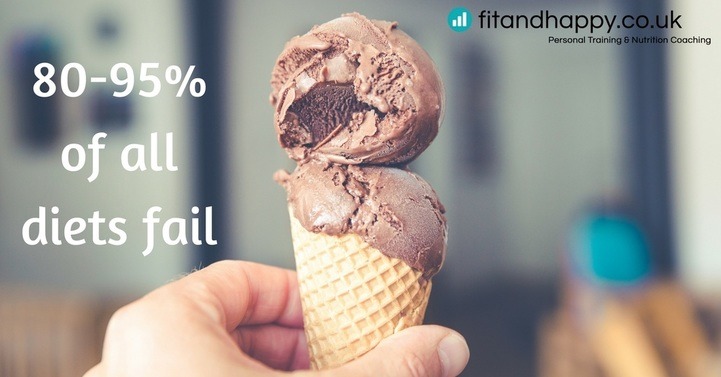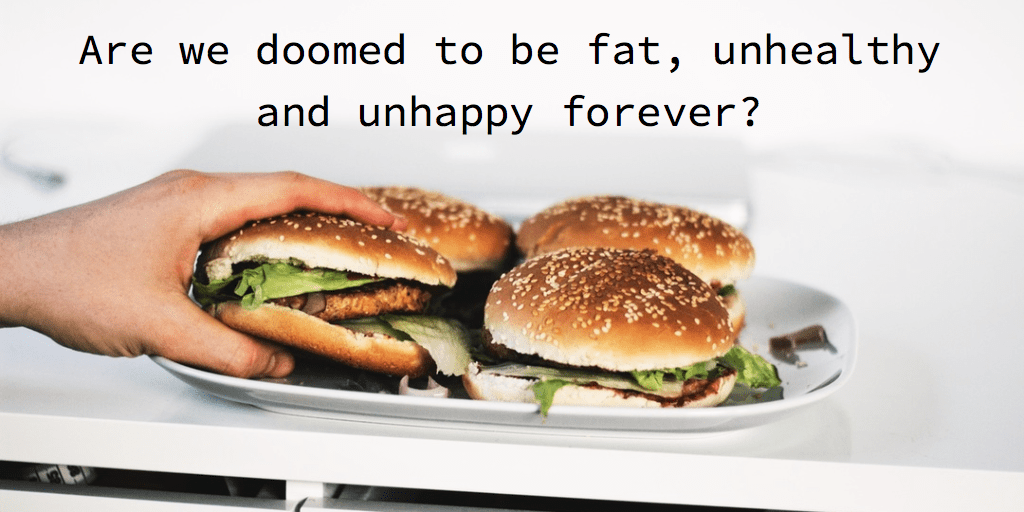
If diets worked, most of us would be super slim.
After all, most of us have been on several diets. Sure, they may work short term. You’re desperate to lose that weight, go to extremes, and are pleased when the pounds start to shed. However, when you start looking at long term success rates, it’s a totally different story: Long term failure rate for dieters is 80% -95%, depending on which study you read. (We don’t know the exact number but researchers have concluded* that there is no evidence that dieting works in the long run)
I’d also like you to remember that diet companies make their money of failure, not success. The more people ‘fail’ (and put the weight back on), and then return to that company, the more money it makes. What nobody points out is that it is not you who is failing, but the diet. If you can’t keep the weight off, the diet hasn’t worked. Don’t blame yourself or lack of willpower. It’s the diet, not the dieter that is the problem. So, let’s correct what I said above: Long term failure rates for DIETS is 80-95%

What are the reasons for such a high failure rate?
- Diets are per definition a temporary measure, so won’t work in the long run.
As soon as you stop the diet, the weight goes back on (and usually more than you have lost). - Your body responds to overly restrictive diets by slowing down your metabolism.
This would be a good thing if you were starving to death. A slower metabolism makes it harder to lose weight. - Some fad diets can actually be harmful and many lack essential nutrients.
You might get slim, but you’ll feel tired, unwell and unhappy. - Very restrictive diets often lead to a cycle of dieting followed by binge eating.
You feel deprived which makes you crave for exactly those foods you have been trying to avoid. When you are dieting, food has and increased reward value. That’s why you start ‘cheating’. - Most fad diets teach you very little to nothing about healthy eating.
Plus, they take all enjoyment out of food. - Diets don’t help you understand why you overeat in the first place.
They also don’t teach you strategiesof how to deal with those cravings. - With most diets, 30-50% or more of your weight loss come from muscle loss instead of fat loss which lowers your basal metabolic rate.
This means your body burns less calories at rest after the diet than before: Welcome to the world of yoyo dieting. - We are all different, and there isn’t one single best diets out there.
Body type, food preferences, intolerances, allergies, budgets, time, lifestyle, physical activity and much more play a role in how we should eat. There are many ways to be well nourished.
So, if diets don’t work, what does?
<!– /wp:paragra犀利士 ph –>
Luckily, there are some strategies that are proven to work:
- Learn to eat slowly and mindfully
- Stop eating when you are 80% full
- Exercise regularly, making resistance training a priority
- Eat mostly fresh, whole unprocessed foods
- Learn to balance your macronutrients
- No foods are forbidden, learn to stick to a ratio of approximately 80:20 (80% whole fresh foods, 20% other)
- Learn to listen to your body’s real hunger cues
- Care about what you eat, turn every meal into an occasion
- Relearn portion sizes
- Look after yourself and get some downtime
- Make sure to get enough sleep
- Manage your stress levels
- Plan ahead, schedule your exercise, prepare meals etc
- Get some help and support to implement these changes
Sounds boring? Well, it probably is. At least it’s not as exciting as the latest celebrity diet. It’s not easy, but it works. To be successful and create healthy habits that last a lifetime, it is vital to implement changes in four different areas of your life: nutrition, exercise, mindset and lifestyle.
The next time you hear about the latest diet craze, ask yourself: ‘Can I see myself doing this in two or three years time?’ or ‘Would I recommend this to my teenage daughter?’
If the answer is ‘no’, then don’t do it. Give the strategies above a go instead.
Don’t want to go it alone?
Book your free 1hour consultation with Julia McCabe, Personal Trainer and Nutrition Coach.
Contact us or email Julia directly: [email protected]
* “We asked what evidence is there that dieting works in the longterm, and found that the evidence shows the opposite” Janet Tomiyama, co-author of the study
http://newsroom.ucla.edu/releases/Dieting-Does-Not-Work-UCLA-Researchers-7832
